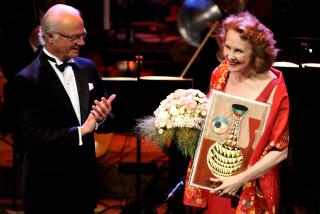Uchida to Play Mostly Mozart in Recital
- Share via
“Why did I start playing the piano?” said Mitsuko Uchida, the Tokyo-born pianist who will appear in recital tonight at Ambassador Auditorium.
“My answer would have to be: Because it was there.”
Speaking by phone from Toronto on the morning of a performance there last week, Uchida elaborated: “It was the only instrument in the house--my brother and sister before me had played--and so when I was 3 years old, I began.
“Now, of course, I have quite different reasons. The piano is the one instrument most like an orchestra--you can play a complete symphonic piece on it, whereas with any other instrument you’d need help. And also, I love the physical action of playing.”
Uchida, 39, has been identified particularly with the music of Mozart since 1982 when, in London (where she now lives), she gave highly acclaimed performances of his complete sonata and piano concerto cycles. She has also recorded the sonatas and is now recording the concertos, with Jeffrey Tate and the English Chamber Orchestra.
“To me, Mozart is one of the most interesting and most inexplicably great geniuses that has ever been,” she said. “Inexplicable because he often uses relatively simple music, but the results are very moving. He might use the same C-major scale as (Austrian etude-composer Karl) Czerny, but with Czerny it’s just a C-major scale and with Mozart it’s a great piece.”
In Pasadena she will play several Mozart compositions, along with Debussy’s Five Etudes and Chopin’s B-flat-minor Sonata.
“The Chopin is the only piece written when its composer was fresh and young,” she noted. “All the Mozart pieces were composed within the last three years of his life. The Adagio in B minor I’m doing is one of the most personal, private pieces he ever wrote. And I chose the Gigue in G because I wanted to show people how very, very modern Mozart was. The music is harmonically inventive and adventurous--you could almost fool people into believing it was a 20th-Century piece.”
Whatever the musical era, Uchida believes that her role as performer is to present the composition, not to show off her technique.
“Although what we musicians do may sometimes be wrong, without a performance the music won’t be alive. When I listen to another pianist, too, I want to hear the music, not the excellence of someone’s finger-work. A performance shouldn’t be an athletic exercise.”
Uchida’s own prowess has brought her an international career of recitals and orchestral performances throughout Europe and North America, as well as in her native country. She also conducts; most notably, she led her own Mozart concerto cycle with the English Chamber Orchestra from the keyboard.
Conductors and string players, even more so than pianists, have inspired her through the years, Uchida said. No small influence was her longtime study under Richard Hauser at the Vienna Academy of Music; she moved to Vienna at 12 when her father was posted with the Japanese diplomatic service there. At 20, she won first prize at the city’s Beethoven Competition.
“Being in Vienna gave me a deep direction,” she acknowledged. “I came from a country where there was no tradition in music, though music was popular, so it was quite good to go to a place which was all tradition.”
More to Read
The biggest entertainment stories
Get our big stories about Hollywood, film, television, music, arts, culture and more right in your inbox as soon as they publish.
You may occasionally receive promotional content from the Los Angeles Times.










